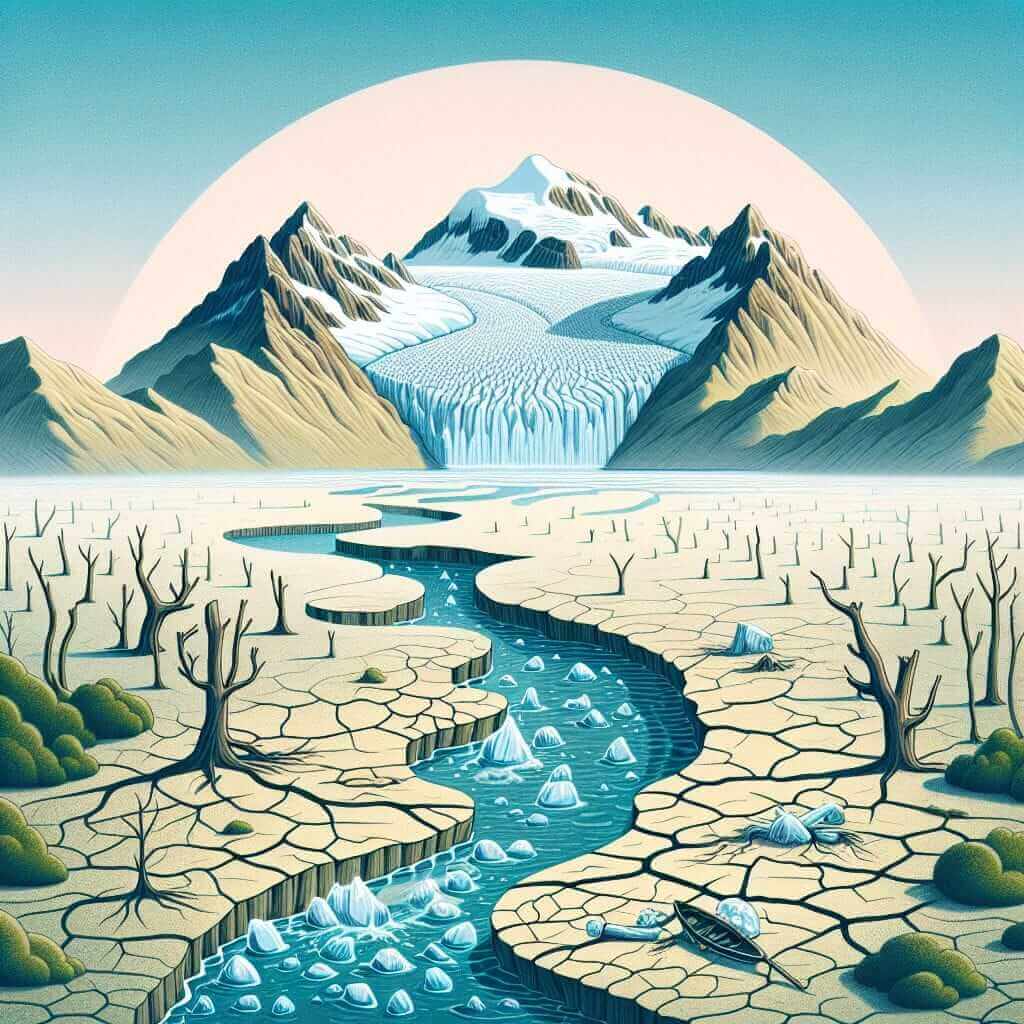The IELTS Reading section tests your ability to understand detailed and often sophisticated materials. Analyzing environmental topics like climate change and its effects on freshwater resources is not uncommon. This topic has appeared several times and might reappear due to its global significance. Understanding the frequent appearance of such topics can help you better prepare for the test.
Practice Reading: Effects of Climate Change on Freshwater Resources
Complete Reading Passage
Easy Text
Climate change is having profound effects on freshwater resources worldwide. Rising temperatures, shifts in precipitation patterns, and melting glaciers collectively impact the availability and quality of freshwater. These changes threaten ecosystems, agriculture, and even human health due to alterations in water supply reliability.
One of the primary results of climate change is increased evaporation, which leads to a reduction in river and lake levels. Moreover, changes in precipitation can cause droughts in some regions and floods in others, disrupting the balance of freshwater distribution. Hydrologic cycles are particularly sensitive, leading to unpredictable water supply.
Melting glaciers are another significant contributor. As glaciers retreat, they initially increase river flows. However, in the long term, there’s less glacier ice to melt, leading to reduced water sources for downstream regions, affecting millions who rely on these supplies.
Furthermore, the increased carbon dioxide levels acidify water bodies, harming aquatic life and reducing the water’s usability for drinking and irrigation. This multifaceted issue demands comprehensive global efforts for adaptation and mitigation.

Questions
Multiple Choice
-
According to the passage, what is one of the main outcomes of climate change on freshwater resources?
A) Increased urbanization
B) Rising temperatures
C) Decreased agricultural yield
D) Increased evaporation -
How do changes in precipitation patterns affect freshwater resources?
A) They improve agricultural productivity.
B) They stabilize hydrologic cycles.
C) They cause droughts and floods.
D) They decrease the need for irrigation.
True/False/Not Given
-
Climate change has no impact on the usability of freshwater for drinking purposes.
- True
- False
- Not Given
-
Glaciers provide a reliable, long-term water source despite climate change.
- True
- False
- Not Given
Matching Information
- Match the information (List of Items) with segments of the passage (Paragraphs A-E).
- Increased river flows due to glacier melt: Paragraph _
- Disruption in water distribution: Paragraph _
Answers
-
D: Increased evaporation.
- Explanation: The passage explicitly states that increased evaporation due to rising temperatures leads to a reduction in river and lake levels.
-
C: They cause droughts and floods.
- Explanation: The passage mentions that shifts in precipitation lead to droughts in some regions and floods in others, disrupting freshwater balance.
-
False.
- Explanation: The passage indicates that increased CO2 levels acidify water, making it less suitable for drinking.
-
False.
- Explanation: The text explains that while melting glaciers initially increase river flows, the long-term effect is reduced water availability.
-
Increased river flows due to glacier melt: Paragraph 3
- Explanation: This information is discussed in paragraph 3 concerning melting glaciers.
Disruption in water distribution: Paragraph 2
- Explanation: Paragraph 2 talks about how changes in precipitation cause droughts and floods, disrupting water balance.
Common Issues in Similar Reading Tests
- Overlooking specific details and generalizing answers.
- Misinterpreting the viewpoint of the passage.
- Struggling with matching heading and information due to misreading.
Vocabulary
- Evaporation (n): /ɪˌvæpəˈreɪʃn/ – The process by which water turns to vapor.
- Precipitation (n): /prɪˌsɪpɪˈteɪʃn/ – Any form of water that falls from the atmosphere.
- Hydrologic cycle (n): /ˌhaɪdrəˈlɒdʒɪk ˌsaɪkl/ – The cycle through which water naturally moves through the environment.
Grammar Focus
- Present Perfect Tense: Used to describe actions that have occurred at an unspecified time before now.
- Example: “Climate change has had a significant impact on freshwater resources.”
- Passive Voice: Often employed in scientific writing to emphasize the action rather than the doer.
- Example: “Freshwater resources are affected by climate change.”
Tips for Improving IELTS Reading Scores
- Skim and Scan: Quickly overview the passage to grasp the main idea, then scan for specific information.
- Time Management: Practice completing passages in less time to improve speed.
- Practice with Authentic Materials: Use past IELTS reading tests to get familiar with the format and difficulty.
- Expand Vocabulary: Regularly learn and practice academic words.
Remember, consistent practice and familiarizing yourself with different types of questions will enhance your confidence and performance on test day.
For more detailed reading materials on similar topics, check out our articles on How Climate Change is Impacting Freshwater Resources and The Effects of Climate Change on Global Water Resources.